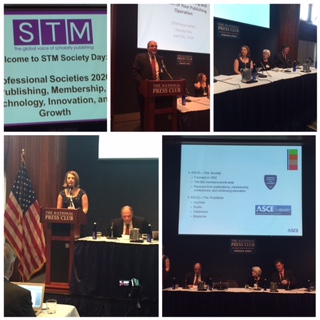
This year I was asked to moderate a panel for Society Day at the annual STM Association conference. We put together a highly informative panel: Angela Cochran, Journal Director for the American Society of Civil Engineers; Edith Holmes, Executive Director, JOSPT (Journal of Orthopaedics and Sports Physical Therapy); and David Gammel, Executive Director, Entomological Society of America. Angela, of course, is my colleague at the Scholarly Kitchen; I am currently serving as an advisor to Edie; and I consulted with David when his group was considering making an arrangement with a larger publisher for comprehensive publishing services (about which more in a minute). The slides for the presentations can be found online; here are the links:
A panel like this (and, for that matter, the creation of a separate Society Day at the annual conference) naturally brings up the question of why do we need to discuss society publishers separately from the rest of the publishing world? The fact is that every publishing segment has its own dynamics and broad generalizations about “publishing” really don’t tell us much. Add to this the stunning ignorance about this industry (for an eye-popper go no further than the recent screed that appeared in the Chronicle of Higher Education, which is well below even the Chronicle’s dismal standards) and the case for a more granular look becomes very strong. Societies often have to deal with different questions from, say, Springer Nature or Sage; and for many societies these different questions may in fact be existential.
The plight of the society publisher has been described by yours truly on the Kitchen before. To sum it up: the industry is in a period of consolidation, brought about not only by the relative maturity of the business but also by tightening institutional budgets and the proclivity for libraries to work with a small number of vendors that sell huge collections, aka “The Big Deal”. So from the point of view of the business side, the question is how to get access to library budgets. Society publishers, many of which are small by contemporary standards, often need to “bulk up” by signing service arrangements with the bigger publishers. What’s at issue, then, is what does it mean to be an independent publisher? Is a society publisher only independent when it can command the attention of its institutional customers? How does growth fit into an assessment? If a society signs an agreement with the satanic forces at Elsevier, Springer Nature, or Wiley, will it lose not only its business independence but its editorial independence as well? And we should not forget some of the more strident charges (this is an election year, after all): Is an arrangement with a commercial publisher simply the first step in a neoliberal takeover of the academy?
Societies that fear that big commercial publishers are going to tell them what to publish display a lack of awareness of how publishing works and why the largest publishers are so interested in society clients. Publishing is a hard game to play, but the hardest part of it by far is managing editorial operations. A businessperson in this industry spends a lot of time wondering how to escape the afflictions of the editorial temperament, with its lack of concern for deadlines, planning (and meeting plans), contracts (aargh!), and the stubborn insistence to heed a Higher Calling. And all of this is true: publishing works because editors and authors are crazy and out of control. Get rid of your crazy people and your publishing enterprise sickens and dies. The dream of the publisher (or at least of the business people within the company) is how to move the business forward knowing that the editorial component is always going to remain front and center no matter how much you influence government policy, introduce technology, and establish a marketing presence in every corner of the globe.
Enter the publishing services arrangement. A large commercial publisher signs up a society client and sets out to do all that a business team can, from lowering costs to adding services — and, critically, disseminating the publications far and wide. Meanwhile, all the headaches of the editorial part of the business remain with the society. It’s a win-win, no?
Maybe yes, maybe no. Our three panelists are managing very different operations. Angela handles a large collection of highly regarded journals in a particular field; ASCE fits the paradigm for the independent publisher nicely. Edie’s shop, on the other hand, while independent, must struggle with the challenging economics of having a single title. To date JOSPT has overcome this challenge, recording growth year over year, not only in revenues but also in its other metrics: submissions, downloads, number of customers, etc. For David’s group at ESA, it became apparent that the best way, perhaps the only way, to take advantage of the growing international opportunity was to align itself with a large publisher. Thus ESA partnered with Oxford University Press, an arrangement that has redounded to the benefit of both organizations.
There is, in other words, no one way to manage a society’s publishing operations. We had three panelists, representing three organizations, which embody three strategies, and all of them successful.
What’s important for a professional society is the “upstream” work, the strategic discussion of where the society wants to go and how publishing fits into that. So often that’s the missing link, the strategic assessment, without which a society publisher will be reduced to simply wondering who will pay the most for the rights. Paraphrasing Horace Greeley, Go Upstream, young person! (The full quotation is: “Washington is not a place to live in. The rents are high, the food is bad, the dust is disgusting and the morals are deplorable. Go West, young man, go West and grow up with the country.” This sounds timely.)
Discussion
1 Thought on "The Society Publisher at the STM Conference"
“Publishing works because editors and authors are crazy and out of control. Get rid of your crazy people and your publishing enterprise sickens and dies.”
This is very funny and certainly reflects a typical day at the office. But why is this actually necessary to support the enterprise? I think with sufficient volume all would be well even without the rogue players.


